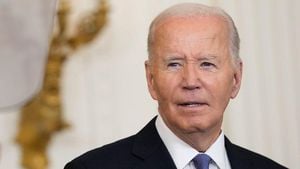Walmart, the retail behemoth, has recently made headlines with its decision to scale back its diversity, equity, and inclusion (DEI) initiatives. This move has sparked discussions across industries, particularly as it aligns with broader trends among U.S. corporations reconsidering their commitment to DEI programs. Once heralded as necessary steps toward inclusivity, these initiatives are now under scrutiny following political shifts and mounting pressure from conservative groups.
The company's announcement indicated it would no longer prioritize supplier contracts based on race and gender. It also plans to stop collecting demographic data for financing assessments, leading to the cessation of certain racial equity trainings and involvement with advocacy groups like the Human Rights Campaign. According to Walmart U.S. CEO John Furner, these changes are intended to create "a sense of belonging" and help the company evolve with its customer base, which he describes as representing all of America.
This decision is not isolated. Several heavyweights including Ford and Toyota are similarly reducing or scrapping their commitments to DEI initiatives, pointing to changing market dynamics and perceived ineffectiveness as reasons. The retreat from DEI policies is occurring against the backdrop of Donald Trump’s return to presidency and the accompanying conservative backlash against what critics label as "woke" culture.
The origins of these DEI programs are rooted deeply within the social movements following George Floyd's murder in 2020. The corporate world witnessed a substantial increase — with over 80% of companies implementing DEI strategies — driven by the Black Lives Matter movement’s call for justice and equality. McKinsey’s report noted positive trends during this time, finding companies leading on diversity were 39% more likely to outperform peers financially.
Fast forward to 2024, the enthusiasm for workplace diversity is waning significantly. Many corporations now observe backlash from conservative factions alleging these initiatives harbor discrimination against white workers. Brands such as Coors, Lowe’s, and even household names like Harley Davidson have either reduced their DEI focus or completely eliminated it. The political climate, influenced greatly by recent Supreme Court decisions against affirmative action, has complicated the DEI narrative, leading corporate leaders to reassess their positions.
The shift appears to be gaining momentum, with figures like Elon Musk publicly endorsing the rollback trends, stating, "The tide has turned," signaling more corporations could follow suit. Meanwhile, reports indicate over half of business leaders find sustaining DEI efforts increasingly challenging, rocking the foundations of what was once seen as corporate social responsibility.
But beyond these corporate landscapes, questions loom large for diverse individuals, particularly among Indian professionals working throughout the U.S. Should they be concerned? The future of workplace equality appears uncertain as DEI is increasingly linked to corporate performance and public sentiment. With the political climate swaying toward more conservative ideologies, what does this mean for the inclusivity efforts initiated just a few short years ago?
For many, DEI was not just about compliance but about cultural change — fostering environments where all employees could thrive. Yet as pressure mounts, the narrative risks sliding back to previous norms, raising the alarm among advocates for equality. Activists express concern over whether this rollback signifies the end of progress or simply a temporary retreat fueled by political tides. The shifting narrative poses challenges not just for companies but for employees who are left to navigate this complex environment of changing commitments to diversity and inclusion.
The loudest advocates for DEI argue passionately about its importance, insisting it plays a pivotal role not only within individual companies but across society at large. The growing skepticism about DEI—from both the public and corporate leaders—could lead to significant setbacks. Can we afford to turn our back on progress achieved only recently? While the debate deepens, the impacts resonate loud and clear, prompting introspection and dialogue on how best to move forward. The coming months will be telling as companies balance financial goals against social responsibilities, and time will reveal the true future of DEI initiatives and their place within American commerce.



